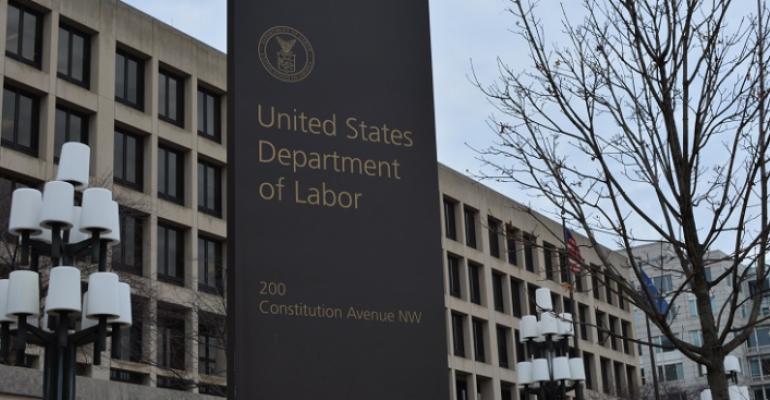When the Department of Labor released its proposed transaction exemption for fiduciaries under ERISA earlier this year, many assumed it would be finalized and in effect before Inauguration Day 2021, whether that meant a second term for President Donald Trump or the start of a newly elected Joe Biden administration. Indeed, it initially seemed placed on a fast track for review, with the DOL originally opting against holding a public comment hearing (though the department later reneged on this point).
But the Trump administration is running out of time to finalize the rule. If a rule is published in the Federal Register less than 60 calendar days before Inauguration Day, an incoming administration would have a chance to place a stay on it for further review. That 60-day marker comes on Friday, Nov. 20. Should the Trump administration fail to submit the rule soon, it would mean the Biden administration would have a chance to stop the rule from going into effect without having to go through its own lengthy rule-making process.
The Trump administration’s proposed rule reinstates a “five-part test” from 1975 that was used as a means to determine whether particular recommendations should be regulated under ERISA’s fiduciary status. It also established a prohibited transaction exemption for fiduciaries as long as they adhered to certain “impartial conduct standards,” though critics argued the exemption could allow ERISA fiduciaries the ability to offer conflicted advice to clients. This aspect of it could mean that it is treated differently from a regulation and may not be subject to the 60-day threshold, but that remains unclear.
The razor-thin margins for finalizing the rule make it particularly vulnerable in a new Biden administration, in contrast to a rule like Regulation Best Interest or even the DOL’s recent ESG rule, according to Andrea McGrew, the chief legal and compliance officer at USA Financial.
“I don’t put it past a Biden administration to aim at Reg BI either, but this one is easier and would be the first step, and it’s focused on retirement assets,” she said. “It would be easy to unwind and make it more extensive, and aggressive for those who feel it didn’t go far enough.”
The delay in releasing the final rule could possibly stem from unexpected opposition from the insurance industry, according to Barbara Roper, the director of investor protection for the Consumer Federation of America. She said the DOL likely would’ve expected opposition from consumer advocates, but insurers insinuating that they could potentially take legal action over the rule would be a different story.
Some insurers expressed concerns about the proposed exemption, as the rule’s wording could potentially extend ERISA’s fiduciary standard to some rollover recommendations that would not previously have been subject to that scrutiny.
Roper questioned whether it was still possible for the DOL to send the rule to the White House for final review and have it published in the Federal Register before Friday, but she did note that the five-part test would not be subject to review by the new Biden administration. Since it’s reinstating an already established rule, Roper said it was already in effect.
“So I do think the Biden administration will take up the issue again to close those loopholes to ensure those rollover recommendations are fiduciary advice under ERISA, and to delineate the standard that applies in those circumstances,” she said.
Jamie Hopkins, the director of retirement research with Carson Group, also wondered whether underwhelming response from insurers delayed the rule and said failing to finalize the rule before the deadline would upend industry expectations. It could also make it more likely that a DOL under Biden would pursue a quickened process for a new rule. However, Hopkins stressed that there’d been discussion about DOL fiduciary rules during the past decade, and it would probably be 2022 before a Biden administration would be in the position of enacting a new rule, should the current one fail.
If the Trump administration's rule does not go into effect, how a new Biden administration would affect advisors depends on the services and products they offer, Hopkins said. For advisors regulated by the SEC’s Best Interest standard working with retirement plans, the effect will be comparatively small, and mostly concern the level of stringency in documenting rollover recommendations and conflicts, and being better prepared to make arguments about the substantive value for the fee they’re charging.
The bigger impact could be in the types of products that are offered, Hopkins believed. But he noted the Obama DOL rule, even if it was eventually vacated, did help prepare firms for a greater emphasis on fiduciary, with firms redoing structures, fees and commissions, as well as offering new sets of products to comply.
“We’ve got really positive changes on the fee and transparency side,” he said. “I would expect, moving forward, that I think the whole country is moving toward this fiduciary expansion. We’re not moving away from that.”
But Hopkins stressed if the Trump administration manages to get the final rule published before it would be vulnerable to review by an incoming Biden administration, he suspected the new administration would start rule-making to overturn it. But that process could be lengthy.
“The Trump rule took almost four years,” he said. “You would expect to live under this rule for multiple years, as advisors."





